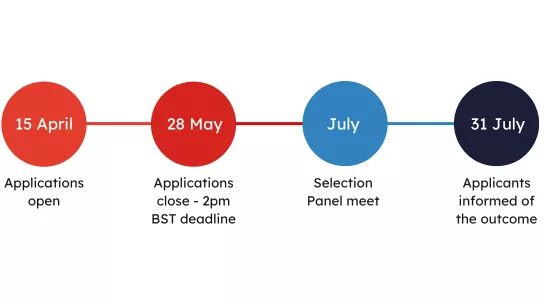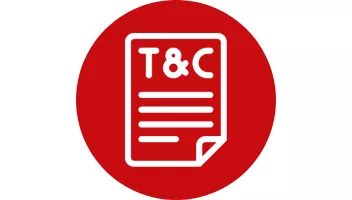Supporting evidence to submit with your application
Confirmation of your disability
This is a document from an official source which confirms that you have a diagnosed disability. Please ensure that the information you provide is relevant to the grant request that you are making. It must state your diagnosis and ideally it will also include an assessment of your needs. It could be one of:
- an originating diagnosis letter from your doctor or healthcare provider
- a DSA Needs Assessment Report (NAR)
- an Educational and Health Care Plan (EHCP)
- a Learning Support Agreement (LSA)
- a mobility assessment/ Occupational Therapy report
We ask for this information to ensure our compliance with our charitable objectives, and so that the Selection Panel can get a more complete picture of the barriers you are facing in education. It also helps them assess that your request is the best possible solution for you and sometimes they can offer additional advice about other sources of support you might be entitled to.
Confirmation of your student status
This is a document from your university or college or institution which states that you have a confirmed place on your course. You can submit a copy of your enrolment letter, a student status letter, or a certificate of student status. Your registry office or student services centre can write this letter for you.
If you have not yet started your course, please submit a copy of your study place offer. If your offer is conditional, that’s fine, you can provide us with proof that you have enrolled at your institution later, but we will need this before we can process any payments for you.
Evidence of the cost of your grant request
You must submit evidence to show the cost of the equipment or support you are applying to us for. This can be a quote or an invoice from a supplier. If you do not yet know the final cost, make an estimate, showing how you have calculated it. Note your calculations in a document, and upload this as one of your supporting documents. All prices must be in GBP.
Here are some examples of how to estimate calculations and what kind of supporting evidence we need from you:
- Human support: provide the hourly rate of your support worker, multiplied by the likely number of hours you will require the support for during the academic year. You will need to provide evidence of the cost estimate of the hourly rate such as a price list, a previous invoice, or a quotation from the provider. If you are applying because the estimated support hours you require exceed the maximum amount of Disabled Students’ Allowance (DSA) available, you can provide your DSA Needs Assessment Report (NAR) and your letter which states your approved DSA allowance.
- Transportation: provide evidence of the monthly or annual ticket cost or cost per journey using a pricelist, a previous receipt for the same journey or a screenshot of a Uber ride or similar to quote for a taxi ride. Then estimate how many journeys you will need to make during the academic year to calculate your total grant request.
- Accommodation for your PA or carer: provide
- evidence that your Local Authority refuses to pay the cost of your carer’s accommodation while you are at university
- evidence that your university will not waive the cost of your carer’s accommodation
- the price/invoice/quote for the cost of your carer’s room at university. Make sure to separately itemise the cost of each individual room if they are on the same invoice/quote.
- Accessible accommodation:
- provide evidence that your university will not provide you with accesible accomodation or waive the additional cost of accessible accommodation
- provide the cost of a standard room which is inaccessible to you along with the cost of comparable accommodation which is accessible for you. For example, if you need accommodation close to campus, compare it with similar standard accommodation which is further away. If you need accommodation with single occupancy bathroom but the standard is for shared bathroom facilities, send proof of the difference in cost between these two. We will pay the difference in cost between these two for the duration of your academic year. Show your calculations, e.g. £650 pcm – £550 pcm = £100 is the difference in cost between accessible and inaccessible accommodation for you per month. £100*8 months in your academic year = £800 is the difference in cost during your academic year which you are applying for a grant to fund.
- Assistive technology, subscriptions, or licences: please provide a cost quotation from the shop or platform that you intend to buy the equipment or service from. If you cannot get a quote, you can provide a screenshot where the item is clearly described, and the price in GBP. Save this as a pdf document if possible and name it “cost quote for (your item)”.
- Mobility equipment: We expect you to have applied to your local NHS Wheelchair Service if you are eligible to. You should submit evidence which confirms the status of your NHS application. This could be:
- The NHS Wheelchair service has assessed your needs but can only provide a contribution towards the equipment – you might be applying for a grant to top up your NHS voucher. Please provide details of the amount awarded by the NHS and reasons why the equipment will not be sufficient for your needs.
- The NHS Wheelchair service has rejected your request. Please include details of the rejection. This doesn’t mean we will also reject your application.
- You are on a waiting list to be assessed for mobility equipment, and already have diagnosis in support of your mobility needs. Please ask your local Wheelchair Service for an estimated waiting time for your assessment. We may be able to help if the waiting times are unreasonable.
- You already know that your request will not be provided by the NHS as it is equipment that the NHS does not award, such as a power add-on. Please explain these reasons in your application. If you have a letter from the NHS or your OT confirming that you would benefit from this equipment even though they can’t supply it, please include this.
- We have mobility expertise on our Panel, which means they can sometimes offer advice about equipment which might be better suited to your needs. This can be particularly helpful if you are uncertain about which equipment will be best. To help the Panel advise you, they would like to have a copy of an assessment of your mobility requirements, e.g. an NHS mobility assessment, or a statement from an Occupational Therapist. If you do not have a letter or other evidence which provides this, you can complete our mobility questionnaire and upload it to your application form in section G -15i Other supporting documents.
Disabled Students’ Allowance (DSA) documents
If you are eligible for DSA, you must have applied for it before you apply for a Snowdon Trust grant. Ideally you will have received the following two documents from the DSA which we require that you submit with your application if applicable:
- Your DSA Needs Assessment Report: this explains your disability support needs and adjustments, and the recommended support measures that DSA believe you need. The document is typically 30 pages long. Please upload the whole document, and make sure it is not password protected or provide us with the password. We cannot accept screenshots of each page, uploaded as individual documents.
- Your DSA approval or rejection letter: This letter states the outcome of your DSA application. It explains the support you have been awarded, or if your application has been rejected. This letter is typically sent to you within two weeks after the needs assessment has taken place. Please upload the whole document, and make sure it is not password protected or provide us with the password. We cannot accept screenshots of each page, uploaded as individual documents.
If DSA has rejected your request, we may still be able to make an award. To help us make a decision, please provide as much supporting evidence as possible about their rejection and their reasons for it. You may have additional email correspondence with your DSA Assessor or other support officer concerning the decision, and this will be helpful for our Panellists to read through. You can save your email correspondence as a pdf by clicking “print” the email, and then selecting your printer as “pdf” rather than a physical printer. Give the file a name which makes it easy to find and upload it with your application.
If you are not eligible to apply for DSA, please explain why. Typical reasons may be that your course is not recognised by DSA, or that you are an international student.
For more information about the Disabled Students’ Allowance please follow the link below.
Disabled Students' AllowanceYour Learning Support Agreement (LSA), if you have one
Your Education and Health Care Plan (EHCP), if you have one
Optional academic reference
We have removed the requirement for an academic reference as part of our application process as we recognise that it can be hard to obtain, and that many students don’t work closely enough with any one member of academic staff for them to be able to provide a meaningful assessment.
If you would like to include an academic reference in support of your application, you can upload one as part of your supporting evidence. The reference should state the name of the referee, their relationship to you (e.g. tutor), the name of the institution which they work for, and be dated.
Typically, the reference will add value if the referee can comment on your academic progress, your attitude towards learning, and barriers you have experienced as a disabled student. It will not affect your application if you do not provide an academic reference.








